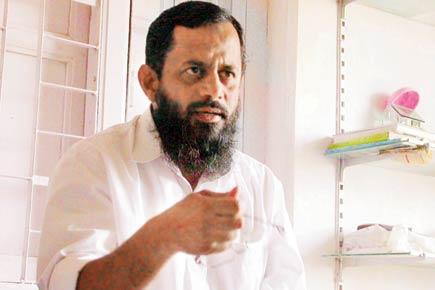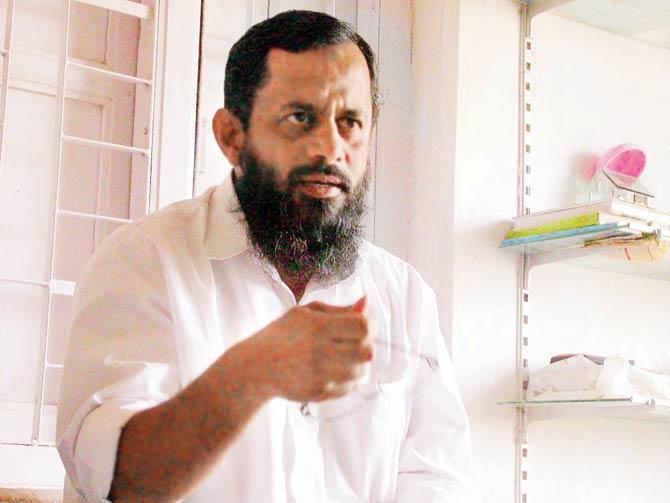Rohini Salian on the interesting facet of Saquib Nachan, who was convicted for arms possession

Saquib Nachan is an intelligent man who used all kinds of tactics to derail the case, including filing hundreds of petitions, Special Public Prosecutor Rohini Salian told mid-day on Tuesday, when a POTA court finally convicted 10 people for the 2002-2003 triple blasts.

“Right from objecting to small things to clubbing all the three bomb blast together to alleging that the court was biased he did everything to delay proceedings,” said Salian. “He would always tell me that he wanted to work as my junior soon after his acquittal and that he was inspired by my arguments.”
Salian said Nachan argued his case himself, and his understanding of the Prevention of Terrorism Act and the Indian Penal Code was so good that he was better than some of the other lawyers who were appearing for the other accused in the case.
“But he lacked an understanding of the Evidence Act, and how to conduct proceedings in a court. If at all he gets to practice, he may turn out to be a good lawyer,” she said.
Nachan, who is on bail in the serial blasts case, is lodged in the Thane Central jail for an attempt to murder Advocate Manoj Raicha. Raicha, a Bajrang Dal office bearer, campaigned against cow-slaughter and would intensify his drive before every Bakri-id, which irked Nachan.
Raicha was shot at thrice in Bhiwandi in August 2012. The police had arrested five people, of which three are on bail, and Nachan and his aid Guddu are still behind the bars.
In the current case, according to Salian, Nachan has been found guilty under Section 4 (possession of certain unauthorized arms) of POTA for possessing an AK-56 rifle. He can be sentenced for between five years and life. However, the prosecution could not establish his role as the main conspirator in the serial bomb blast.
Salian said the police had recovered a few empty AK-56 shells from the hills of Mahuli and Karwa near Padgha using metal detectors. The shells matched the weapon recovered from Nachan’s medical shop in Bhiwandi.
Maharashtra is one of the eight states that had been declared a notified area under POTA. Under the draconian notification, if anyone was found to be in possession of a firearm, the presumption is that the weapon was intended for use in terrorist acts.
Salian said that soon after the police submitted the 5000-page charge sheet on July 19, 2003, Nachan started filing applications along with other accused.
In 2004, when charges were being framed, Nachan managed to get a Supreme Court order staying the entire trial process on the ground that the three bomb blasts cannot be combined. In 2008, the SC ordered the trial court to begin.
Soon, Nachan and others moved the Bombay High Court seeking bail on the ground that they had already spent more time in jail and no charges were framed even after the charge sheet was filed. The POTA court granted bail to most of the accused, excluding Nachan, who was finally out on bail in 2011. In 2014, charges were finally framed.
Though the delay was attributed to the accused, Salian said the POTA court granted bail to everyone except one accused who confessed of planting the bombs at all three spots. Unlike other Acts, confession under POTA can be used only against the accused who made it, and not others. The prosecution produced 154 witnesses in the blast cases. The defence crossed-examined 30.
According to ACP Nagesh Lohar, it was while out on bail that Nachan attempted to murder Raicha.
The last POTA case
This is the last case under the draconian POTA, which replaced TADA in 2001. The Aksardham case and Parliament attack case were under POTA. Unlike IPC provisions, where an accused is sent to remand for 14 days, in POTA he can be kept in custody for 30 days. It was mandatory under POTA that the investigating officer should be of ACP rank. Unlike the routine practice in IPC, where a charge sheet should be filed within 90 days of registering an FIR, POTA allowed the police to file the charge sheet in 180 days. Cases could be tried in only special designated courts. Only four months after its enactment the police and other agencies had arrested 250 people nationwide. Eight months later, seven states had arrested over 940 people. When it was repealed, at least 560 people were still in jail.
Interest for law
Police sources said Saquib Nachan graduated in commerce from a Bhiwandi college and was associated with the Students Islamic Moment of India (SIMI) since a long time before it was outlawed. In 1992, the CBI arrested Nachan under TADA, along with terrorist Lal Singh, for conspiring to commit terrorist acts. A lot of arms and ammunition were recovered from them when they were arrested in Ahmedabad. Nachan was sentenced to life in prison and send to Sabarmati jail. There, he started reading law books and even challenged his conviction in the Supreme Court, which turned his life imprisonment to 10 years in jail. While in Sabarmati, he bought the famous Black Dictionary form the UK, a vaunted reference book for senior counsels and barristers. He was released in 2002.
 Subscribe today by clicking the link and stay updated with the latest news!" Click here!
Subscribe today by clicking the link and stay updated with the latest news!" Click here!







